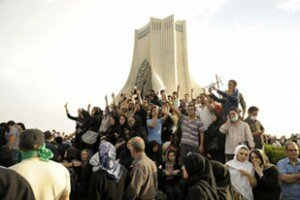A CALL FOR SUBMISSIONS: Visions 2042: Notes toward a Racial Order Transformed
Talk About Race, Visions 2042 — By Andrew Grant-Thomas on March 22, 2010 at 5:30 amImagine that the year is 2042 and that surely, dramatically, and transformatively, the racial landscape of the United States has changed over the course of the century. The long-forecast end of the United States as a white-majority country in that year may or may not be an important part of the story. Race still matters, but operates now much more to unify rather than divide us. Many trace the change to the Obama era that ended a quarter-century earlier – not necessarily because of any big new federal policies implemented during that president’s time in office, but also because of other social and institutional developments that took seed or began to flower then. Some social justice oldtimers recall that they wept when Obama, our first nonwhite president, first took office. They did not know that even more meaningful developments were just ahead.
We invite you to elaborate this vision. Visit the Visions 2042 Project page for more information.
Author: Andrew Grant-Thomas (12 Articles)

Andrew Grant-Thomas is Deputy Director of the Kirwan Institute. He directs the Institute’s internal operations and oversees much of its US-based programming. His substantive interests include structural racism and implicit bias, alliance-building between immigrants and African Americans, African American males and gender dynamics within the African American community, and the promotion of systems thinking through videogames. Andrew serves as Associate Editor of the Institute’s journal, Race/Ethnicity: Multidisciplinary Global Contexts. He also edited Twenty-first Century Color Lines: Multiracial Change in Contemporary America, published in 2008 by Temple University Press. He is a regular contributor to Racewire.org and WOSU radio and sits on the boards of several nonprofit organizations and various social justice initiatives. Andrew came to the Kirwan Institute in February of 2006 from the Civil Rights Project at Harvard University where he directed the Color Lines Conference and managed a range of policy-oriented racial justice projects. He received his B.A. in Literature from Yale University, his M.A. in International Relations from the University of Chicago, and his Ph.D. in Political Science from the University of Chicago.


 Share This
Share This Tweet This
Tweet This Digg This
Digg This Save to delicious
Save to delicious Stumble it
Stumble it





 Obama accepts Nobel Peace Prize
Obama accepts Nobel Peace Prize A precious story of mental illness
A precious story of mental illness Rafsanjani urges 'freedom' in Iran
Rafsanjani urges 'freedom' in Iran Africville apology is a start, not an end
Africville apology is a start, not an end







